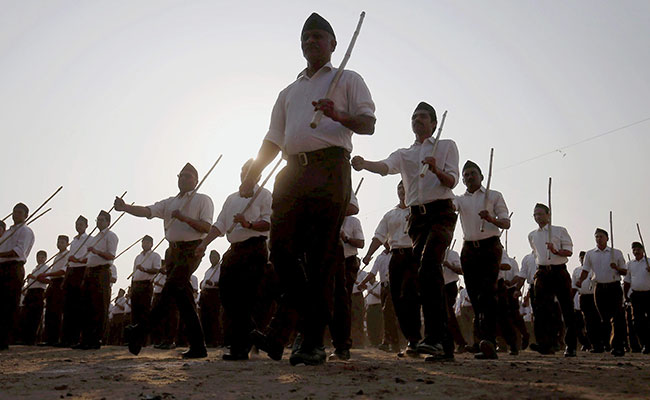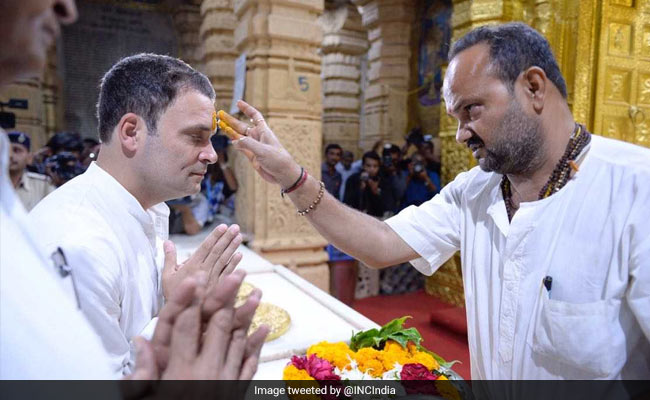"Future of Bharat: An RSS Perspective", the three-day unprecedented outreach initiative by the RSS that was just held in Delhi hogged the national limelight for a variety of reasons. Like the timing: six months before the 2019 elections, almost at the far end of the five-year term of the NDA government. And the pronouncements: to say that the Sangh is not interested about who comes to power and that it does not seek to influence governance. All this is remarkably strategic on the part of Shri Mohan Bhagwat, the Sarsanghchalak and undisputed guide and philosopher of the entire Sangh Parivar.
Mohan-ji, as he is fondly addressed by Sangh Swayamsevaks is known to be very measured and cautious about his utterances and choice of words. He has seldom raised a controversy during his eight-year stint as RSS chief. Though he wields immense authority, he has not once thrown his weight around or made a statement that could remotely be construed as a guideline for BJP governments at the centre and states. He does not hobnob with the Prime Minister or Chief Ministers, though he has the capacity to create occasions that would allow him to do so. In a true sense Mohan-ji has all these years followed the uniquely subdued, apolitical tenets of the Sangh existence as a socio-cultural power-house for nation- building.

RSS chief Mohan Bhagwat at the three-day outreach conclave 'Bhavishya ka Bharat - an RSS perspective'
The growth, reach and influence of the RSS now after an existence of nearly a century instill the confidence that it is the ideological mosaic of India's future. No other organization in history has such a coveted record. It has no narrow, selfish or parochial agenda. Param Vaibhav, the ultimate glory of the Motherland, is the goal with which it works. At least 30 years before Mohan Bhagawat became Sarsanghachalak, RSS ideologue Dattopant Thengadi used to say that under Mohan-ji, the Sangh will reach its golden era. "He will reinvent and reinterpret and establish the Sangh on its real foundations," Thengadi had said prophetically.
Mohan-ji has explicitly laid down the Sangh style of working and the priorities before it. Under him, a swayamsevak is the President of India. Swayamsevaks are the Prime Minister, Vice President, heads of Lok Sabha and Rajya Sabha and the heads of almost two-thirds of state governments. This background is crucial to evaluate the meaningful declaration of the Sangh conclave and to understand its full import. He stressed the Sangh's commitment to nation-building, character, glory of motherland and cultural ethos and ethical values in public life. To argue as some critics and opposition leaders have done, that the Sangh found it necessary to explain itself because it was under attack from Congress chief Rahul Gandhi, or that it had to reach out to improve its own image, are to play down the true essence of the Sangh exercise to widen its canvass.

The RSS or Rashtriya Swayamsevak Sangh is the ideological mentor of the ruling BJP and is often seen as controlling the reins behind the scenes
In fact, Dr Mohan Bhagawat in the wake of the Sangh's most respected phase in its existence, tactfully and eloquently reclaimed the whole gamut of nationalist legacy by citing great leaders of the freedom moment, connecting Dr Keshav Baliram Hedgewar's role in the Congress and independence struggle, invoking the nationalist Congress tradition and stressing the socio-cultural role of the Sangh in the present. He has tried to position the RSS as the conscience of a resurgent India.
Read it in the aftermath of Pranab Mukherjee's address in Nagpur in July where the former President of India described Hedgewar as a great son of India. Mohan-ji i was naturally formulating the nationalist space that the opposition parties in general and Congress in particular have vacated. That is why Dr Bhagwat emphasized that he is not bothered about the religious practices of people. One can follow any way of worship, he declared. Quite elaborately he dealt with religion, the Constitution, what Dr Ambedkar spoke of the Hindu Code, and the distinction between the government which follows the Constitution and the principles governing a vibrant society. Here he dealt extensively on Dr Hedgewar. This is significant.

Former President Pranab Mukherjee at Hedgewar memorial in Nagpur with RSS chief Mohan Bhagwat
This does not mean that the Sangh is diluting its core beliefs. It only is an explanation to those who want to understand the Sangh with an open mind. The Sangh has never been apologetic or defensive about its principles.
It is interesting that Sangh-BJP critics have seen an invitation to the Congress and a warning to the BJP in what Mohan-ji said about indifference to the political fortunes of parties; some even suggested that Sangh workers will support a Congress under Rahul. This is sheer wishful thinking. But Rahul's eagerness to show himself as "Shiv Bhakta" and a sacred thread-wearing Brahmin is amusing to the RSS' core constituency. The RSS has always felt that the Indian polity should become Hindu-centric like the European or American polity is Christian-centric. This is different from the politics in Islamic countries where the religious rights of others are trembled and crushed. The RSS had given a chance for Congress and other parties by extending an invitation to listen to the RSS chief. A dialogue would have been possible. While many diplomats and film personalities, like many BJP leaders and ministers, participated in the event, the Congress and others only criticized from the sidelines.

Congress chief Rahul Gandhi at the Somnath temple in Gujarat
The BJP is in a way forcing Rahul Gandhi to confront the Indian reality. While on election tour, not even once has the Prime Minister visited temples, but Rahul is desperately trying to prove his Hindu credentials by going to Kailash Mansoravar and temples, which he started doing during the state election in Gujarat, then in the Karnataka polls and now at the national level. The RSS will certainly welcome any rabidly anti-Hindu leader out of political expediency donning the Hindu chhadar. The issue here is credibility of the leader.
The RSS exercise simply was for those who genuinely wanted to understand it. The Sangh at the zenith of its ideological success will be magnanimous and reach out but is not likely to dilute or reinvent itself.
(Dr R. Balashankar is Member, BJP Central Committee on Training, and Committee on Publications and former Convener BJP National Intellectual Cell and former Editor Organiser.)
Disclaimer: The opinions expressed within this article are the personal opinions of the author. The facts and opinions appearing in the article do not reflect the views of NDTV and NDTV does not assume any responsibility or liability for the same.


